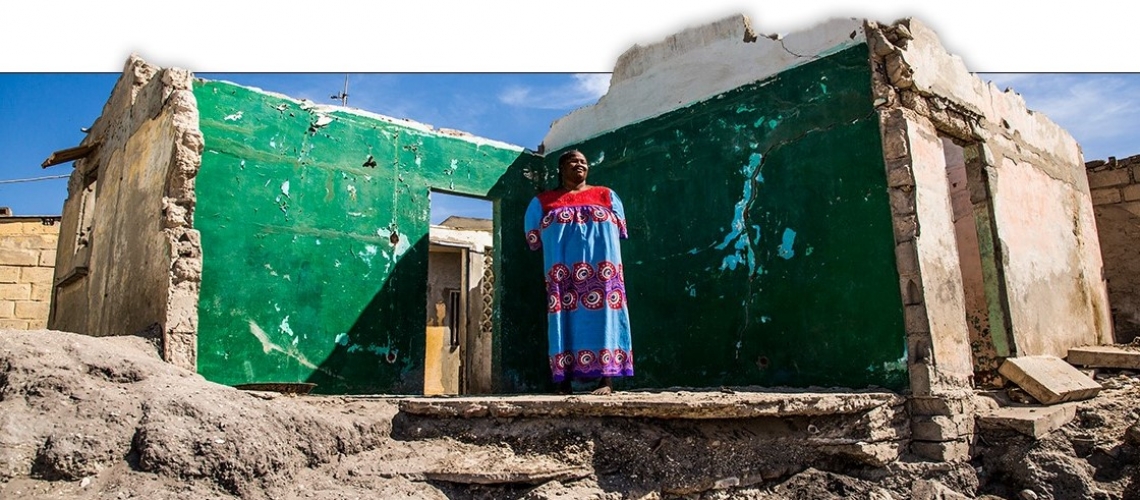Blog |
Maximizing Innovation and Finance for Coastal Resilience in West Africa
Adapted, efficient and resilient infrastructure is a key component to help alleviate poverty.
Rallying the private sector to help deliver on climate-resilience infrastructure and on overall development goals is a tall challenge. Adapted, efficient and resilient infrastructure is a key component to help alleviate poverty and achieve the SDGs. It’s about connectivity, energy, ports, roads, urban transport, and waterways, and it’s about managing the environmental footprint of infrastructure. Only by connecting people, firms, markets, and lagging regions, and understanding the risks to the environment, can we succeed in our mission.
Engaging the private sector is critical for an in-depth understanding of the technologies, innovations, and financial tools that must be deployed and scaled up to bring change. We get even further when private sector actors commit firmly to sustainability and corporate social and environmental responsibility.
This is particularly true in Africa where rapid urbanization, extreme weather, and pollution are degrading the coast and preventing communities’ progress—and where competition may not be fully leveraged because of governance challenges.
More than half of West Africa’s GDP is generated in coastal areas, a concerning statistic when paired with the following projection from the World Bank: by 2050, West Africa is expected to experience sea level rise of up to 0.6 meters, higher incidences of extreme rainfall, a temperature increase of 2°C, and 5,500 square kilometers of flooded coast. What does and will this look like on the ground? Entire villages and towns under water—including homes, and infrastructure like wells, schools, health clinics, and work places.
We need climate-resilient infrastructure, disaster risk management preparedness, and nature to play its role —such as using mangroves and wetlands to protect from coastal erosion and flooding—to secure coastal livelihoods and help countries leapfrog development. Quickly.
So how do we rapidly respond to these challenges and assist the public and private sectors in their respective roles? Collaboration is key. An example is the World Bank-led West Africa Coastal Areas Management Program (WACA), which offers a visionary way of working to transform the lives of coastal communities by acting as a platform where partners bring their respective finance and knowledge to the table and actively engage in dialogue to problem-solve—because no one alone can resolve the challenge of coastal erosion, flooding, and pollution that prevents sustainable growth and threatens local livelihoods.
Recently, the World Bank’s WACA Program and the Infrastructure Finance, PPPs & Guarantees (IPG) Global Practice joined forces. The collaboration offers an opportunity to bring in IPG’s experience in using financial instruments to make the public and private sectors closer— and applying it to the specific development challenge of sustainable coastal development.
We cannot stress enough the need to build green, gray, and hybrid infrastructure that can play a critical role in preserving the coastline by protecting it against coastal erosion, fix dunes, restore mangroves, and replenish beaches. That is why IPG sponsored the recent WACA Call for Innovation to crowdsource ideas for sustainable ports. This was made possible by the Nordic Development Fund, a climate and development partner to the World Bank, and the Quality Infrastructure Investment (QII) Partnership, housed in IPG and funded by Japan, whose objective is to raise awareness and scale up attention to the quality dimensions of infrastructure in developing countries.
The development of coastal infrastructure with limited planning and consideration of its impact are a visible factor of coastal erosion , with effects seen up to 50 km downstream. For example, after the creation of the hydroelectric Akosombo Dam in Ghana, littoral dynamics were modified in Togo—reducing sediment flow, accelerating shoreline retreat, and destroying villages and plantations.
The WACA Call for Innovation closed at the end of last year and some transformative ideas emerged, including these three winners:
- WAC-App: an interactive coastal planning tool to explore the impacts of coastal interventions presented by HKV-UNESCO-DELFT Institute
- Trans-Sand: an idea for a transnational bypass scheme funded by a public-private dredging fund presented by Egis-Deltares-FinanceforImpact
- SA-POD: a systematic integrative approach for port development, presented by WITTEVEEN, CDR, BOSKALIS, PENAF, and WETLANDS
IPG and WACA have committed to work together to increase the feasibility of these innovations and develop upstream business cases for public-private partnerships. IPG also offered to help countries and partners mobilize financing from the private sector. Its goal is to push for innovations and even more for their replicability.
The WACA Marketplace is another avenue where we’re looking to collaborate. This will allow IPG to support WACA to catalyze the development of coastal-resilience investment projects and mobilize finance by matching countries’ demand with investors’ resources.
Through these efforts, we hope to maximize the positive impact of infrastructure, raise economic efficiency, and integrate sustainability in infrastructure investment in order to truly transform coastal livelihoods.
Authors

Fatouma Toure Ibrahima, Practice Manager, PPP Group Infrastructure Finance, PPPs and Guarantees (IPG) Group, Infrastructure Vice Presidency The World Bank

Peter Kristensen, Lead Environmental Specialist in the Environment and Natural Resources Global Practice at the World Bank Group
